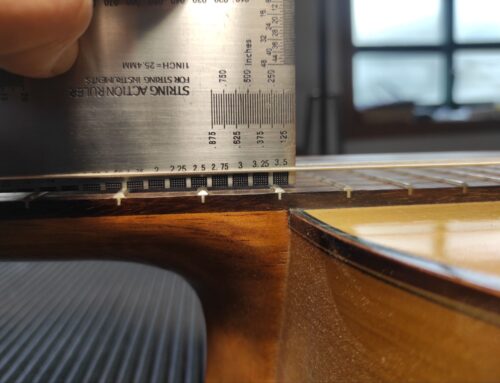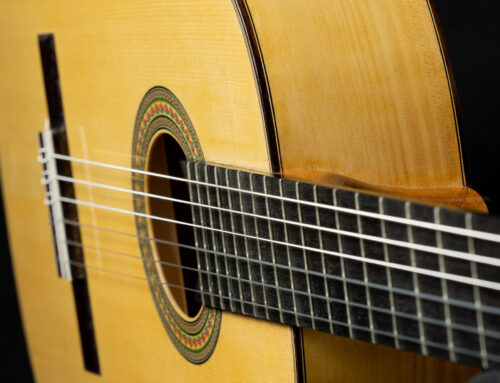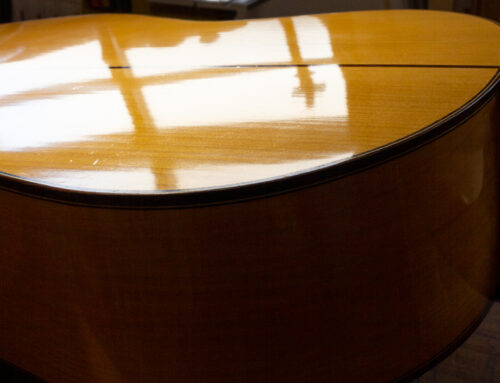The fretboard of the guitar is one of the parts of the instrument most subjected to the inclemencies of daily use. A good part of the “playability” or comfort of your guitar is at stake. Normally, it is a part that is not protected with any varnish, and that in the day to day suffers the action of sweat and the friction of our fingers against it. Keeping it properly clean and hydrated can help to avoid scares and repairs that are not -at all- easy to undertake. In this post I leave you some simple recommendations for cleaning.
Why should I care about cleaning and hydrating the fingerboard?
The fingerboard is one of the parts to which the player spends more time in his day to day. Your gaze travels up and down the frets, trying out fingerings, contrasting how this note sounds on this string and whether it looks nicer to play it on that string, etc. I don’t think I need to explain all this to you: your left hand is a hand to which as a classical guitarist you dedicate a lot of time. But that hand has to play on a “court” that is in good condition.
A poorly maintained fretboard can cause problems such as uneven frets, deformations due to excessive dryness, cracks in the top or even rust in the frets that generate noises.
If you practice any sport you will know the importance of the pavement for a good development of the game. Something similar happens with the fingerboard, and as a result of a bad periodic maintenance can occur in it uneven frets, deformations due to excess of dryness, cracks in the top, oxidations in the frets that generate noises, etc. So everything that affects the fretboard will have a direct impact on how much you enjoy playing with your guitar. So the only advice in this post is to clean your fretboard frequently.
How often should the fretboard be cleaned?
This question, as almost always, has no single answer. I would say that the ideal is to clean the fretboard every time you change the strings. And how often should you change the strings? Well, that depends on how much you play the guitar and how sensitive you are to “need” a string change when you notice that the sound has lost the nice brightness you like. I know guitarists who try to play with old strings, but usually you like a bright and clear sound, which will force you to change them every relatively little time. Anyway, if you change the strings every few hours, you don’t need to clean the fretboard all the time, but in any case, don’t forget to do it, let’s say every two or three weeks.
A string change is a perfect occasion to give the fretboard a cleaning, removing the mixture of dirt and sweat that tends to accumulate, especially near the frets.
So a string change is a perfect occasion to give the fretboard a cleaning, removing the mixture of dirt and sweat that tends to accumulate, especially next to the frets. You already know that it’s not a good idea to remove the strings all at once when you do string changes. Unless you need to do it for a repair, it is better to avoid it in order not to generate sudden changes of tension in the neck that could cause an alteration of the angle of the neck with respect to the soundboard, with the consequent change in the height of the strings and other unpredictable and generally undesirable consequences.
Lemon oil to clean the fingerboard
Use to clean the fingerboard any product that removes all that dirt, avoiding excessively corrosive agents. Personally, I use this lemon oil cleaner manufactured by D’Addario, which you can find on Amazon at a reasonable price (link here). Just soak a few drops of the product on a kitchen paper and rub all that dirt until it disappears. This product is great, because besides cleaning the dirt, it will help you to keep the fretboard hydrated, which is as important as keeping it clean.
Since you are going to change the strings correctly, and you are going to replace them one at a time, the cleaning should be done in the space you create when you remove each string, before replacing it. Put the paper towel soaked in lemon oil in there, remove all the dirt and your fretboard will be clean and hydrated.
I hope this post has helped you to pay some attention to the proper maintenance of the fretboard, which will make your guitar a good working tool for much longer.






Leave A Comment